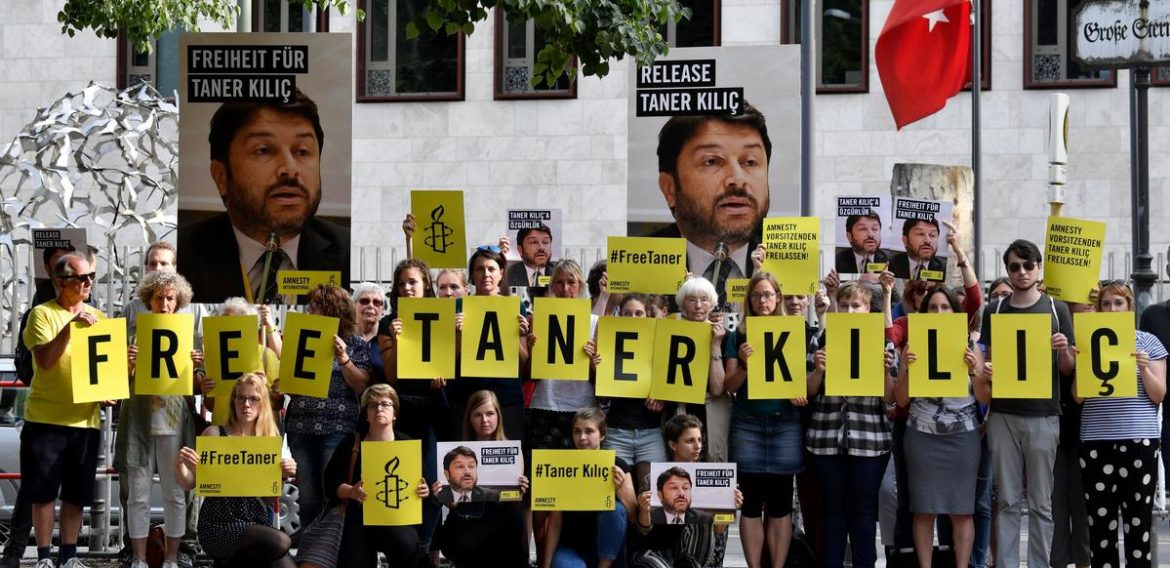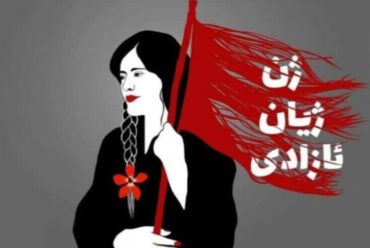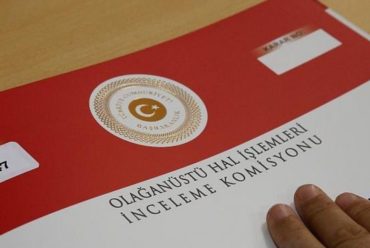Persecution of human rights defenders in Turkey
Friday’s conviction of four human rights defenders of terrorism charges in Istanbul continues the pattern of prosecutions designed to restrict human rights defenders and silence critical voices. These baseless convictions are consistent with the recent warning of Council of Europe Commissioner for Human Rights, Dunja Mijatovic, of a politicised Turkish judiciary criminalising legitimate and peaceful activities (see here).
Former chair of Amnesty international Turkey Taner Kılıç was detained in June 2017 on suspicion of membership of a terrorist organisation on the basis that he had downloaded and used the ByLock messaging app. His case was joined with the ‘Büyükada’ defendants, ten human rights defenders arrested on 5 July 2017 during a police raid of a human rights and digital security workshop on Büyükada island.
The Istanbul Assize Court No. 35 convicted Taner Kılıç of membership of a terrorist organisation and sentenced him to six years and three months in prison. It convicted three others of aiding and abetting a terrorist organisation and sentenced them to 25 months in prison – İdil Eser (Amnesty Turkey’s former director), Özlem Dalkıran (a member of the Citizen’s Assembly) and Günal Kurşun (a member of the Human Rights Agenda Association). The court acquitted seven other defendants, including two European nationals, Ali Gharavi (Sweden) and Peter Steudtner (Germany).
Amnesty International’s Turkey researcher, Andrew Gardner, observed the trial and denounced the convictions as “a travesty of justice of spectacular proportions” and “a crushing blow not only for Taner, Özlem, İdil and Günal and their families but for everyone who believes in justice, and human rights activism in Turkey and beyond” (see here).
The convictions are alarming for the lack of evidence of wrongdoing presented to the court. They constitute clear violations of the rights of human rights defenders and the rights to freedom of expression and freedom of association and assembly. The 1999 UN Declaration on Human Rights Defenders (see here) guarantees the rights to hold meetings or peaceful assembly (Article 5), to “know, seek, obtain, receive and old information about all human rights” (Article 6) and to “participate in peaceful activities against violations of human rights” (Article 12). Prior to Friday’s judgment, the UN Special Rapporteur on the Situation of Human Rights Defenders, Mary Lawlor, expressed alarm at the lack of evidence of any criminal acts (see here). In a message endorsed by the Special Rapporteurs on human rights and countering terrorism, expression and assembly and association, Lawlor commented:
“If any of the 11 human rights defenders receive a guilty verdict, Turkey is sending a message that no one is fully free to stand up for human rights in the country.”
The case against Kılıç also reflects a troubling acceptance of Turkish judges that anyone accused of having downloaded or used the ByLock messaging app must be part of the ‘Fethullah Gülen Terrorist Organisation’ (‘FETÖ’), which the government accuses of being behind the putsch of 15 July 2016 (see here). ByLock was freely available through Google Play and the Apple Store and downloaded more than 600,000 times globally between April 2012 and April 2016. Two forensic examinations of Kılıç’s phone, including one by technology company SecureWorks, found no trace of the app. Nor were the Istanbul cybercrime police department able to find evidence he had used the app. The court was unfazed and convicted regardless.
Turkish judicial practice in this respect is in clear breach of international human rights law. The UN Working Group on Arbitrary Detention has held that detention for using ByLock violates the right to freedom of opinion and expression under Article 19 of the Universal Declaration of Human Rights and Article 19 of the International Covenant on Civil and Political Rights. The Working Group’s findings in the case of Muharrem Gençtürk (see here), a former Associate Professor of Commercial Law at Akdeniz University in Antalya, are equally applicable to the conviction of Taner Kılıç:
“The Government has made detailed submissions about how this application was used by the FETÖ/PDY terrorist organization. However, the Working Group observes that while these explanations are rather broad and relate to the general usage of ByLock by FETÖ/PDY, they do not provide any detailed explanation as to how the alleged used of this application by Mr. Gençtürk could be equated with a criminal act (…). The Working Group notes the failure on the part of the Government of Turkey to show how the mere use of such a regular communication application as ByLock by Mr. Gençtürk constituted an illegal criminal activity. In fact, it appears to the Working Group that even if Mr. Gençtürk did use the ByLock application, an allegation that he denies, it would have been mere exercise of his right to freedom of expression.”
Friday’s convictions bear the same rejection of basic legal principle and of Turkey’s international human rights obligations y the judiciary. Turkish prosecutors and judges appear free to construct illegality and to criminalise at will. The defendants are free pending the outcome to their appeals. With Osman Kavala in prison in spite of the demands of the European Court of Human Rights (see here), however, there is little evidence Turkish authorities might back down from their campaign against human rights defenders.
Image source :https://static.dw.com/image/42395744_605.jpg







